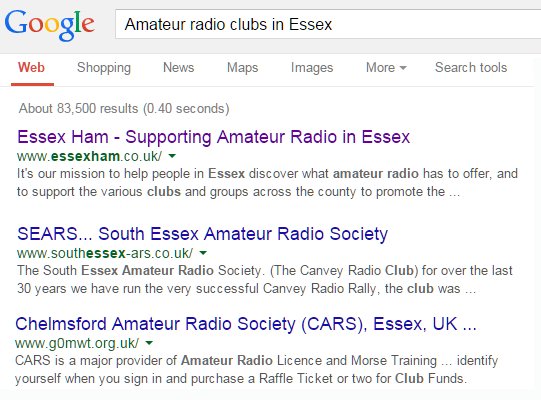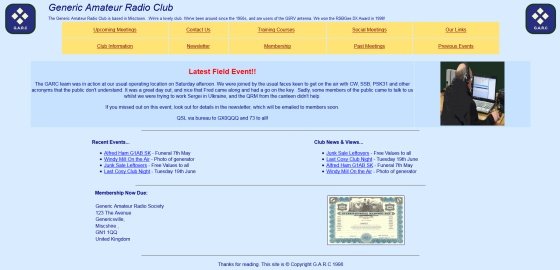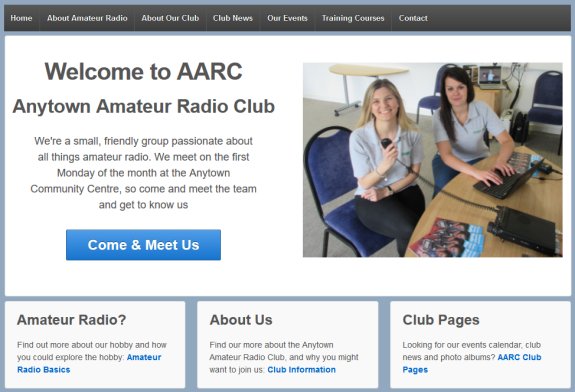 This post is something of a call-to-arms for those either involved with an amateur radio club in Essex, or who are active members of clubs in Essex. Could we be better online?
This post is something of a call-to-arms for those either involved with an amateur radio club in Essex, or who are active members of clubs in Essex. Could we be better online?
The article is inspired by a letter in the back of a recent Radcom (“Up To Date”, page 97, August 2015 RadCom). The letter from Alan Nixon G1EFU comments that, on returning to the hobby after many years of activity, he discovered that many club websites are woefully out-of-date – suggesting that if a club wants to have a web presence, it needs to be up-to-date.
Those who know me personally probably know that my day job is as a website consultant, so I’m no stranger to the online world and knowing what makes a site succeed or fail. To keep Essex Ham up-to-date, I routinely monitor all sixteen of the amateur radio clubs sites in Essex. Last week, I completed my monthly look at the local sites, and you might be interested in the findings:
Update on club websites in Essex
Following our August review, I’ve prepared a short quiz:
- Which four clubs are prominently listing events that happened over a month ago as events as “coming soon” on their front pages?
- Which site has a design issue preventing a list of next club meetings from displaying?
- Which three clubs list their upcoming events for next couple of months as “TBC” with little or no information?
- Which site has no “home” button, so you can’t navigate to the front page?
- Which site has an “email us” button on the front page that doesn’t work with modern browsers?
This echos the comments in Radcom – Sites that are out-of-date, look like they’re twenty years old, or actually don’t work, doesn’t help either the club or the hobby.
Club Site Stats
The monthly stats for the local sites makes interesting reading. Two of the more active local clubs show month-on-month decline in traffic and Google ranking, whilst other clubs barely rank at all.

It’s also worth looking at the sales pitches that clubs make in their Google listings. Looking at the first few entries, you can see why they’re topping the charts – but reviewing the results for other clubs in Essex goes some way to explaining the lower rankings:

In many cases, the relatively low Google results, or the poor ‘sales pitch’ is because the person responsible for running and updating the site doesn’t have the time to keep up-to-date with current search engine trends, or best practice for website visibility. As has been said lots – this is “only a hobby”, and sites are run by volunteers who don’t always have time to spare.
Essex… We have a problem…
My club-wide check this month was a little deeper than usual, and I surprised myself:
- Only 2 of the 16 clubs I looked at had a link to their own Facebook page on their front page. With over 30 million UK Facebookers – are clubs missing a trick?
- 6 of the 16 had a link to their own Twitter feed – At least one club with a Twitter feed fails to link to it on the front page
- Only 3 of the 16 sites offered any kind of “sign up to us” way of opting in to get more information or newsletters
- Trying to make contact with 5 clubs from a mobile was problematic – either links didn’t work, or there’s no clickable email link, meaning you have to faff about to get the email address copied from web to email applications
A mere 6 of the 16 websites pass Google’s Mobile Friendliness test, meaning Google won’t go out of its way to recommend those sites for those browsing on a mobile device.
Club sites – What’s the point?
Fundamental question – What’s the point of an amateur radio club website? Is it:
- A) A place for members to find out about upcoming meetings?
- B) A recruitment tool for getting new members? or
- C) A tool for getting new people interested in the hobby?
Looking around the local sites, the answer has to be Option A. Many of the sites offer lists of meetings, event write-ups, newsletters and club announcements – and that’s fine. The risk is that without attracting new members and new people into the hobby, the audience will decline.
Our feeling is that whilst a club may want to focus on its members, why not also cater for potential new members too – Surely it can’t hurt a club to attract new members?
Only a small number of sites we looked at cater for newcomers. Don’t believe me? Take a look at one or two of the Essex amateur radio club websites, and see if you can find their “What is amateur radio” section, or a summary of how to get started in the hobby.
As a newcomer to the hobby, which of the following sites would appeal to you the most?


How we help:
“Don’t bring me problems… bring me solutions”
Looking in Radcom, it’s clear that Essex is leading the way in holding events – Region 12 is probably the busiest part of the UK, and it’d be great to see Essex dominating the online amateur radio scene too. With our online experience, perhaps we can help…
- We’ve been an active part of the RSGB Inspire project to help stimulate change in how we promote the hobby. With the findings now released, we’re working on some of the findings and doing what we can to improve how amateur radio is promoted – you’ll see more on this soon
- We’ve just released a PDF guide which steps through some of the more common pitfalls and suggests practical ways that sites can improve. See: Improving Club Websites
- We’re very happy to perform a review on any club website in Essex, on request, to highlight some of the possible areas for improvement and how to get better visibility. An open invitation to all clubs in Essex – contact us if you want some advice, suggestions or help.
Incidentally, we were contacted by Alan, the author of the letter in Radcom. Purely by chance he got in touch after finding our Getting Back into the Hobby page. He’s what he had to say:
“I would just like to thank you for your wonderful website that answered all the questions I had. Well Done everyone at Essex Ham and a BIG THANK YOU !!”
How you can help:
If you’re a member of a local club, or involved with running a club – Take a look at your club’s site in the cold light of day – and see if anything could be done to make it better.
- Not happy with your club’s website? Let them know
- Something about our website that you don’t like or want to see changed? Let us know
We’d love to get your views on this article, and also to know what you expect from your club’s website – Please feel free to add a comment below.
Related Links
- Improving Amateur Radio Websites – Including a PDF file with some practical suggestions and advice
- Hams vs the Interwebs – An excellent review of some of the ways that radio clubs promote themselves online, written by Charlie M0PZT
- Amateur Sites failing the Google Friendliness Test
- How to Promote Amateur Radio
- Promoting Amateur Radio in Essex


We do not think you could improve (essex ham) its a great club only wish we could be there .73 g2ary + m0bqd
This is not a problem that is linked just to ham radio. I am in the amateur dramatics side of life. I am my drama groups website admin and know enough to get me by when it comes to coding. Most clubs they rely on less skilled people to build these sites and pass the information. Often broken links is a sign of groups who the webmaster does not have the support to make it work.
Here is the age old thing. We have a website why do we need to update it so much. Groups do not also use facebook as the appeal to older members does not help get new members. Again its a another who updates it. Mobile friendlyness on websites is more key but then again there are so many different ranges of devices what one do you make sure it work on.
I think for the most for many its time thats a factor….being most of us are juggling a full time job with family or other comitments.
Good common-sense article Pete, well done.
I doubt the clubs will take any notice though as they’re stuck in the past.